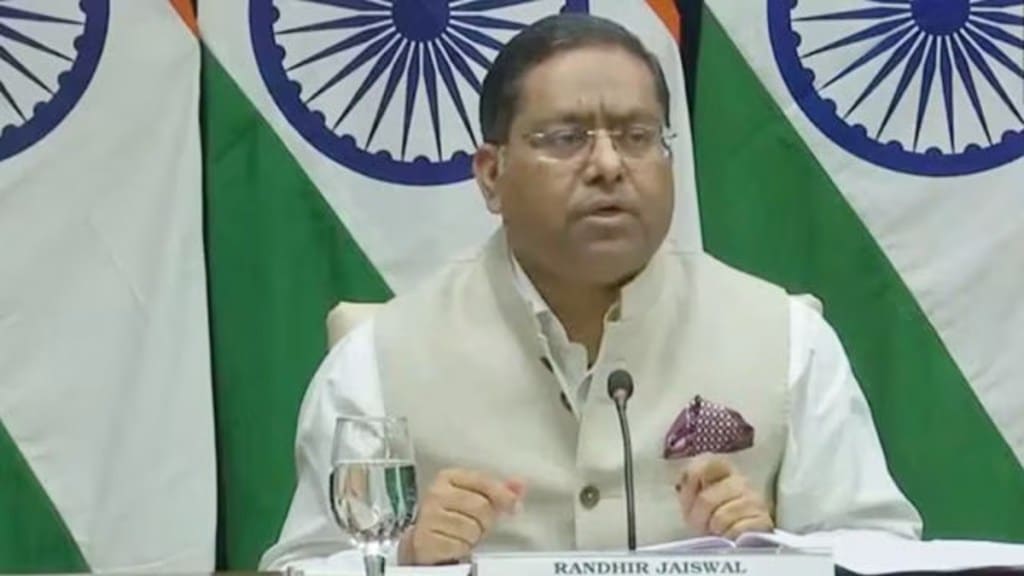Illegal immigration has been one of the defining issues of global politics, with governments around the world grappling with how to balance border security with human rights. India, despite its large diaspora, has consistently maintained a policy stance that supports the return of its citizens who are illegally residing abroad, working in close cooperation with countries, including the United States, to ensure the identification and repatriation of its nationals. This policy is part of India’s broader strategy to address irregular migration while safeguarding legal avenues for migration, such as work visas and student exchanges.
During a recent weekly briefing, in response to FinancialExpress.com, India’s Ministry of External Affairs spokesperson, Randhir Jaiswal, reaffirmed this commitment, stating, “As part of India-US cooperation on migration and mobility, both sides are engaged in a process to deter illegal migration. This is being done to create more avenues for legal migration from India to the US.” His comment highlights India’s proactive stance in working with the US to identify and repatriate Indian nationals involved in illegal migration, ensuring that the process is orderly and consistent with international norms.
A Growing Global Challenge
While the United States has long struggled with the issue of illegal immigration, it has gained renewed urgency under President Donald Trump, who has made it a central focus of his second-term agenda. Trump’s emphasis on securing the US border and cracking down on undocumented migrants has been a major part of his political platform, and in November 2024, he proposed using military resources to enforce mass deportations of illegal migrants. The announcement came in the context of rising concerns over irregular migration, particularly from countries like Mexico, Venezuela, and increasingly, India.
According to reports, around 18,000 Indian nationals have been identified by the US government as having entered the country illegally. Their citizenship documentation has been verified, and plans are in place to repatriate them to India. “This is part of India’s long-standing policy of cooperating with governments to ensure that our citizens are returned once their nationality has been confirmed,” explained former Ambassador Anil Trigunayat, adding, “The irregular migration issue was discussed between Dr. Jaishankar and Secretary of State Rubio yesterday, underscoring both countries’ commitment to resolving this challenge.”
India’s cooperation is not just limited to the US but is part of a broader strategy to manage migration flows responsibly, including working with countries like Canada, Saudi Arabia, and Japan. With a growing number of Indians crossing illegally into the US through the northern border, particularly in fiscal 2023 where over 90,000 Indian nationals were intercepted, it has become increasingly important for India to maintain a cooperative dialogue with these nations to deter irregular migration.
A Delicate Balance Between Security and Opportunity
India’s cooperation in addressing illegal migration is carefully balanced with its commitment to maintaining and expanding legal migration channels. The H-1B visa program, which allows skilled workers from countries like India to work in the US., is a vital part of India’s migration framework. In return for cooperation on deportations, India hopes to ensure the continued availability of such programs. Indian citizens accounted for nearly three-fourths of the 386,000 H-1B visas issued in 2023, underscoring the importance of legal migration to both nations.
Further, India’s approach is guided by a desire to protect its citizens from the risks associated with illegal migration, which can involve exploitation and lack of access to basic rights. By working with governments like the US., India aims to create a more secure, orderly, and sustainable framework for migration, allowing its citizens to pursue opportunities abroad while safeguarding their rights.
Addressing Domestic and International Concerns
India’s cooperation also addresses some of the broader geopolitical concerns, including the fight against secessionist movements. Some Indian nationals involved in illegal migration have been linked to movements such as the Khalistan movement, which advocates for a separate Sikh state. India has long viewed these movements with concern, and a strict stance on illegal migration helps mitigate the influence of such groups, particularly those operating from foreign territories.
Moreover, India’s proactive approach to repatriation aligns with its broader international strategy, which includes migration agreements with countries like Taiwan, Saudi Arabia, and Israel. These agreements ensure that Indian citizens abroad have access to legal pathways for work and residence, which ultimately benefits both the migrants and their host countries.
A Policy of Responsibility
India’s policy regarding illegal immigration is rooted in the principle of responsible citizenship. As the number of illegal Indian migrants rises, particularly through less traditional entry points like the northern US-Canada border, India remains committed to working with its global partners to address the issue. The country’s approach is reflective of its broader commitment to ensuring that migration is both lawful and sustainable, and that its citizens who find themselves in difficult situations abroad are brought home in a manner that respects both their rights and the legal frameworks of the countries involved.
In conclusion, India’s cooperative efforts with the US and other nations reflect a global commitment to addressing illegal immigration while safeguarding legal migration channels. As immigration remains a central concern in global politics, India’s role in repatriating its nationals is an example of how countries can balance security, human rights, and the aspirations of their citizens, ultimately working toward a more orderly, humane, and sustainable system of global migration.
